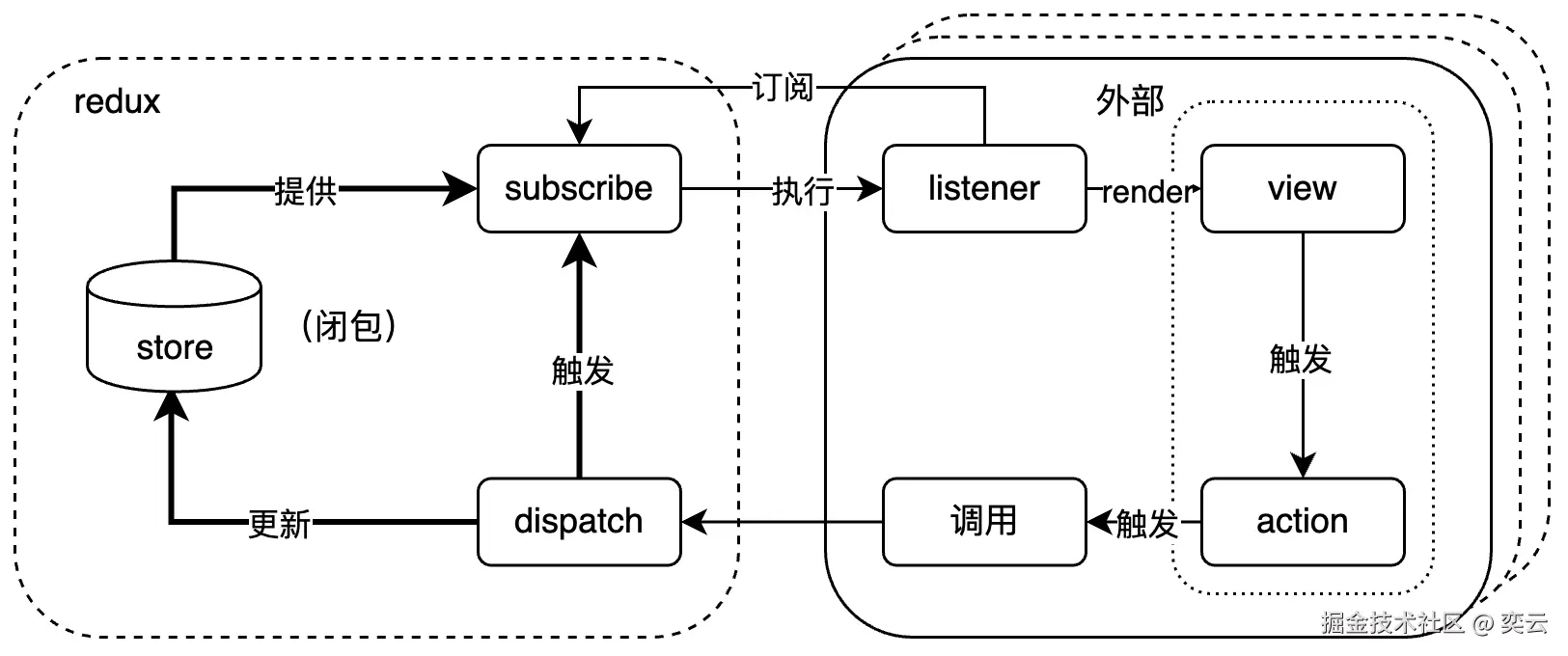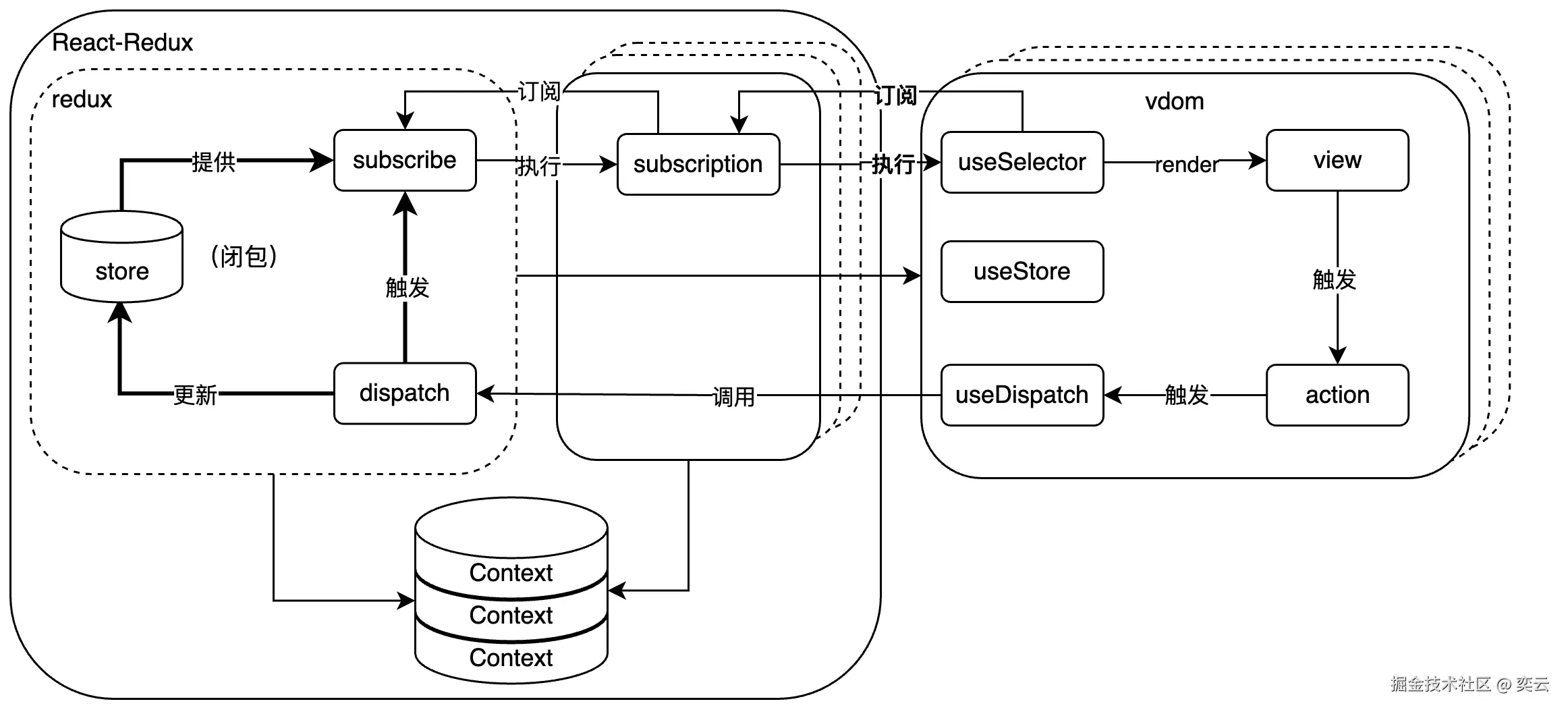引言:
- redux采用闭包+订阅发布模式实现全局状态管理。
- react-redux 主要采用ReactContext将 redux store 共享给其他子组建。子组件使用 useSelector 订阅 store状态,该hook内部由 useSyncExternalStore和selector 实现,分别实现触发渲染和避免重复渲染的功能。使用useDispatch 更新store,然后触发一系列监听者,实现视图更新。


redux 实现原理
0. redux整体设计

在阅读源码前,我们先看看原生redux 是如何使用的:
js
// 首先定义一个reducer
function count(state, action) {
const defaultState = {
year: 2015,
};
state = state || defaultState;
switch (action.type) {
case 'add':
return {
year: state.year + 1
};
case 'sub':
return {
year: state.year - 1
}
default:
return state;
}
}
// store的创建
const createStore = require('redux').createStore;
const store = createStore(count);
// store里面的数据发生改变时,触发的回调函数
store.subscribe(function () {
// render dom
console.log('the year is: ', store.getState().year);
});
// action: 触发state改变的唯一方法(按照reducer的第二个参数)
const action1 = { type: 'add' };
const action3 = { type: 'sub' };
// 改变store里面的值
store.dispatch(action1); // 'the year is: 2016
store.dispatch(action3); // 'the year is: 2015从使用中可以很明显的看到 redux 的核心功能 createStore()
我们这就看下这个函数的实现方式:
【输入】:reducer、初始值
【输出】:getState() 、subscribe()、dispatch()
- 利用将状态 保存在 currentState(闭包)中
- 通过发布订阅模式 派发状态变更
js
export function createStore(
reducer, // 用户定义的 reducer
preloadedState, // 初始值
enhancer, // store增强, 本文暂不讨论
){
// 1.参数处理,确保参数接收正确
if(){
...
}
// 实现部分
// 这里闭包变量,用于保存store的状态和监听器
let currentReducer = reducer
let currentState = preloadedState
let currentListeners = new Map() // 存放listeners
let nextListeners = currentListeners
let listenerIdCounter = 0 //
let isDispatching = false // 是否处于 执行action 状态
//使用 Map 存放 listener, 执行 subscribe 调用
function ensureCanMutateNextListeners() {}
// 获取当前状态
function getState(){}
// 添加订阅
function subscribe(listener) {}
// dispatch 方法
function dispatch(action) {}
// 替换reducer
function replaceReducer(nextReducer) {}
// 观察者模式
function observable() {}
// 执行reducer 初始化
dispatch({ type: ActionTypes.INIT })
const store = {
dispatch,//用于 action 分发
subscribe,//注册 listener,实现 state改变后,能够通知其他调用者
getState, // 获取当前状态
replaceReducer,// 替换reducer
[$$observable]: observable
}
return store
}接下来我们看下 getState() 、subscribe()、dispatch() 这个三个函数的实现
- getState()
【输入】:无
【输出】:全局状态
- 获取闭包中的 state
js
function getState {
// 禁止在 reducer 中调用 getState
if (isDispatching) {
throw new Error()
}
return currentState
}- dispatch()
【输入】:action
【输出】:action
- 执行reducer,触发订阅器
js
//let currentReducer = reducer
function dispatch(action) {
try {
isDispatching = true // 标注 分发状态,避免在 在执行recuer 过程中使用 getState()
// 每次状态更新都会获取一个全新的 全局状态对象
currentState = currentReducer(currentState, action) // 执行传入 reducer;
} finally {
isDispatching = false
}
const listeners = (currentListeners = nextListeners)
// 触发订阅者回掉函数,todo: 为什么不把 currentState 直接传递到listener中
listeners.forEach(listener => {
listener()
})
return action
}- subscribe()
【输入】:listener
【输出】:取消订阅函数
js
// 闭包变量
// let currentListeners = new Map()
// let nextListeners = currentListeners
// 这里使用 两个 listener 列表,为避免在 执行reducer 过程中重新添加新的listener 出现死循环导致栈溢出
function ensureCanMutateNextListeners() {
if (nextListeners === currentListeners) { // 在dispatch 中会同步 listeners
nextListeners = new Map()
currentListeners.forEach((listener, key) => {
nextListeners.set(key, listener)
})
}
}
function subscribe(listener) {
let isSubscribed = true // 设置某个订阅状态,用于标识是否被取消订阅
ensureCanMutateNextListeners()
const listenerId = listenerIdCounter++ // 设置监听器ID(key)
nextListeners.set(listenerId, listener)
// 返回 一个 取消监听器 的函数
return function unsubscribe() {
if (!isSubscribed) { // 避免多次调用 取消订阅,造成性能消耗
return
}
isSubscribed = false
ensureCanMutateNextListeners()
nextListeners.delete(listenerId)
currentListeners = null
}
}2. 其他功能
- combinReducers()
随着应用越来越大,一方面,不能把所有数据都放到一个reducer里面,另一方面,为每个reducer创建一个store维护起来页比较麻烦,因此需要对reducer进行分片整合。
还是先从使用入手:
js
// 创建两个reducer: count year
function count (state, action) {
state = state || {count: 1}
switch (action.type) {
default:
return state;
}
}
function year (state, action) {
state = state || {year: 2015}
switch (action.type) {
default:
return state;
}
}
// 将多个reducer合并成一个
var combineReducers = require('redux').combineReducers;
var rootReducer = combineReducers({
count: count,
year: year,
});
var createStore = require('redux').createStore;
var store = createStore(rootReducer);源码实现:
【输入】:reducers 对象
【输出】:返回一个类似 reducer 的函数
- 首先拷贝传入对象,避免直接引用导致reducers被以外更改,出现状态不一致问题
- 遍历reducers 所有属性依次执行所有reducer
js
export default function combineReducers(reducers) {
const reducerKeys = Object.keys(reducers)
const finalReducers= {} // 拷贝 reducers
for (let i = 0; i < reducerKeys.length; i++) {
const key = reducerKeys[i]
if (typeof reducers[key] === 'function') {
finalReducers[key] = reducers[key] // 拷贝
}
}
const finalReducerKeys = Object.keys(finalReducers)
let shapeAssertionError
try {
assertReducerShape(finalReducers) // 验证reducer 参数
} catch (e) {
shapeAssertionError = e
}
// 返回一个总reducers函数,其中联合了所有reducer,在触发dispatch 时通过遍历的方式 执行对应的action
// 实现功能:
// 1. 整合所有 reducer 的状态为一个状态,使用reducers 的key 作为每个 state 的key;
// 2. 遍历调用所有 reducer 函数
return function combination(
state = {},
action
) {
if (shapeAssertionError) {
throw shapeAssertionError
}
let hasChanged = false
// combineReducers 更新逻辑 遍历所有reducer
const nextState = {}
for (let i = 0; i < finalReducerKeys.length; i++) {
const key = finalReducerKeys[i]
const reducer = finalReducers[key]
const previousStateForKey = state[key]
// 注意:根据传入 action 执行所有reducers ,因此会导致相同的type 都被执行
const nextStateForKey = reducer(previousStateForKey, action)
nextState[key] = nextStateForKey // 整合所有reducer 的状态
hasChanged = hasChanged || nextStateForKey !== previousStateForKey // 通过 === 确定是否改变状态
}
hasChanged =
hasChanged || finalReducerKeys.length !== Object.keys(state).length
return hasChanged ? nextState : state
}
}- applyMiddleware()
- 只是一个 compose() 的使用
js
export default function applyMiddleware(...middlewares) {
return createStore => (reducer, preloadedState) => { // 返回createStore 方法
const store = createStore(reducer, preloadedState) // 创建 store
let dispatch = () => {
throw new Error(
'Dispatching while constructing your middleware is not allowed. ' +
'Other middleware would not be applied to this dispatch.'
)
}
const middlewareAPI = {
getState: store.getState,
dispatch: (action, ...args) => dispatch(action, ...args)
}
const chain = middlewares.map(middleware => middleware(middlewareAPI)) //TODO: 创建中间件链
dispatch = compose(...chain)(store.dispatch) // 组合函数,创建链式调用,将中间件插在 dispatch 之前执行
return {
...store,
dispatch // dispatch 替换
}
}
}
// 再看看redux-thunk的实现, next就是store里面的上一个dispatch
function thunkMiddleware({ dispatch, getState }) {
return next => action =>
typeof action === 'function' ?
action(dispatch, getState) :
next(action);
}3. 总结
通过看源码发现redux 实现还是比较简单 闭包+订阅发布模式 ,这使得它能够整合在任意框架中。那么他是如何整合在react中的呢?
2. react-redux
1. 整体设计

整体设计:react-redux 主要采用ReactContext 将 redux store 共享给其他子组建。子组件使用 useSelector 订阅 store状态,该hook内部由 useSyncExternalStore和selector 实现,分别实现触发渲染和避免重复渲染的功能,使用useDispatch 更新store,然后触发一系列监听者,实现视图更新。
2. 核心实现 Provider & useEelector
在使用react-redux 都需要在组件树顶端添加 Provider 同时,将 store 作为参数传入,我们这就看看 Provider 做了什么?
1. Provider 组件
【输入】:
- children: 子组件树
- store: redux store对象
- serverState: 支持SSR(本文不讨论)
- context: react Context组件,自定义redux 要使用context
【输出】:Context组件
主要工作内容:
- 创建订阅器,这里之所以要再次创建一个订阅器,而不是直接使用redux 原生的订阅器,是因为Provider可以多次调用 但所有Provider却共享同一个Context对象(这个我们可以在 ReactReduxContext 中看到),这样通过增加中间订阅器的形式,可以快速实现Provider卸载后取消订阅。
- 全局共享同一个 Context对象,并将其挂在到 全局对象上便于获取。
- 监听 contextValue ,在组件更新时,实现更新订阅者的功能。
js
// Provider 实现方式
function Provide(providerProps) {
// store 由 redux createStore 方法创建
const { children, context, serverState, store } = providerProps
// 定义Context 的存储对象
const contextValue = React.useMemo(() => {
// 创建 订阅器
const subscription = createSubscription(store)
const baseContextValue = {
store,
subscription,
getServerState: serverState ? () => serverState : undefined,
}
return baseContextValue
}, [store, serverState])
// 保留状态,确定状态是否改变
const previousState = React.useMemo(() => store.getState(), [store])
//根据环境(浏览器或者 native)使用 useEffect 或者 useLayoutEffect
useIsomorphicLayoutEffect(() => {
const { subscription } = contextValue
subscription.onStateChange = subscription.notifyNestedSubs //指定订阅stroe 的回掉
subscription.trySubscribe() // 创建订阅器
if (previousState !== store.getState()) {// store 变更时主动 Provider的通知订阅者
subscription.notifyNestedSubs()
}
return () => {
subscription.tryUnsubscribe()
subscription.onStateChange = undefined
}
}, [contextValue, previousState])
const Context = context || ReactReduxContext // 创建Context 保存 store
return <Context.Provider value={contextValue}>{children}</Context.Provider>
}- ReactReduxContext 实现源码
该变量的主要功能是为Provider组件提供Context对象
js
const ContextKey = Symbol.for(`react-redux-context`)
// 获取全局对象
const gT = (
typeof globalThis !== 'undefined'
? globalThis
: {}
)
function getContext(){
if (!React.createContext) return {}
// 这里将 Context挂载到全局 对象中,便于子组建能够在任何位置获取 Context对象
const contextMap = (gT[ContextKey] ??= new Map())
let realContext = contextMap.get(React.createContext)
if (!realContext) {
realContext = React.createContext(
null,
)
if (process.env.NODE_ENV !== 'production') {
realContext.displayName = 'ReactRedux'
}
contextMap.set(React.createContext, realContext)
}
return realContext;
}
export const ReactReduxContext = /*#__PURE__*/ getContext()- createSubscription(store)
创建一个订阅器,该订阅器收集来自vdom对状态的订阅,通过监听store 的变化,执行vdom的执行回掉。
tip: 可以先看 useEelector 的实现,在返回来看这里跟容易理解
js
const nullListeners = {
notify() {},
get: () => [],
}
// 发布订阅模式
export function createSubscription(store, parentSub) { // 这里的parentSub 主要目的是为了 类组件 在使用 connect时能够将子组件都传递到同一个Provider 订阅器上。
let unsubscribe // 取消 store订阅的函数(streo.subscribe的返回值)
let listeners = nullListeners
let subscriptionsAmount = 0 // 订阅计数器
let selfSubscribed = false
// 添加订阅:useSelector 订阅 Provider 时使用的方法
function addNestedSub(listener) {
trySubscribe()
const cleanupListener = listeners.subscribe(listener)
// cleanup nested sub
let removed = false
return () => {
if (!removed) {
removed = true
cleanupListener()
tryUnsubscribe()
}
}
}
// 执行 订阅回掉
function notifyNestedSubs() {
listeners.notify()
}
// 订阅stoer变更时的回掉
function handleChangeWrapper() {
if (subscription.onStateChange) {
subscription.onStateChange()
}
}
function isSubscribed() {
return selfSubscribed
}
// 订阅 store
function trySubscribe() {
subscriptionsAmount++
if (!unsubscribe) { // 检测是否已经订阅
unsubscribe = parentSub // 订阅store
? parentSub.addNestedSub(handleChangeWrapper)
: store.subscribe(handleChangeWrapper)
listeners = createListenerCollection()
}
}
// 取消订阅 store
function tryUnsubscribe() {
subscriptionsAmount--
if (unsubscribe && subscriptionsAmount === 0) {
unsubscribe()
unsubscribe = undefined
listeners.clear()
listeners = nullListeners
}
}
function trySubscribeSelf() {
if (!selfSubscribed) {
selfSubscribed = true
trySubscribe()
}
}
function tryUnsubscribeSelf() {
if (selfSubscribed) {
selfSubscribed = false
tryUnsubscribe()
}
}
const subscription = {
addNestedSub,
notifyNestedSubs,
handleChangeWrapper,
isSubscribed,
trySubscribe: trySubscribeSelf,
tryUnsubscribe: tryUnsubscribeSelf,
getListeners: () => listeners,
}
return subscription
}
// 订阅器 监听列表 双链结构
function createListenerCollection() {
return {
// 清空订阅列表
clear() {},
// 触发订阅回调
notify() {},
// 获取订阅列表
get() {},
// 添加订阅,返回取消订阅的方法
subscribe(callback) {},
}
}2. useSelector
【输入】:
- selector: store分片函数
- equalityFnOrOptions: 状态比较函数
【输出】:
- state: 一个状态对象,变更后触发渲染
js
export const useSelector =createSelectorHook()
const refEquality = (a, b) => a === b
// useSelector 核心实现
export function createSelectorHook(context = ReactReduxContext) {
// 由useContext 实现,通过全局对象获取 Context 上的 value
const useReduxContext =
context === ReactReduxContext
? useDefaultReduxContext
: createReduxContextHook(context) // 源码实现在下文
// 返回的 useSelector 函数内容
const useSelector = (selector, equalityFnOrOptions = {}) => {
const { equalityFn = refEquality } =
typeof equalityFnOrOptions === 'function'
? { equalityFn: equalityFnOrOptions }
: equalityFnOrOptions
const reduxContext = useReduxContext()
// 结构 value 值
const { store, subscription, getServerState } = reduxContext
//封装 selector函数
const wrappedSelector = React.useCallback(
// 先定义一个对象,然后通过【】获取属性,为获取其动态方法名,便于调试
{
[selector.name](state) {
const selected = selector(state)
return selected
},
}[selector.name],
[selector],
)
// useSyncExternalStoreWithSelector 核心实现为 react 提供的 useSyncExternalStore
// 这里是避免重复渲染的关键
const selectedState = useSyncExternalStoreWithSelector(
subscription.addNestedSub,
store.getState,
getServerState || store.getState,
wrappedSelector,
equalityFn,
)
React.useDebugValue(selectedState)
return selectedState
}
//辅助ts进行类型推断
Object.assign(useSelector, {
withTypes: () => useSelector,
})
return useSelector
}- createReduxContextHook
js
export function createReduxContextHook(context = ReactReduxContext) {
return function useReduxContext(): ReactReduxContextValue {
const contextValue = React.useContext(context)
return contextValue!
}
}- useSyncExternalStoreWithSelector
【输入】
- subscribe:一个订阅器,添加订阅的方法
- getSnapshot: 获取状态值的方法
- getServerSnapshot: ssr 下获取状态值的方法
- seletor:切片函数,避免重复渲染的关键,实现更细粒度的状态监听
- isEqual: 状态比较函数,默认 ===
【输出】:一个 状态值
- 该hook是实现触发组件渲染和避免重复渲染的关键,其核心依赖react18 提供的新 hook useSyncExternalStore。 因此大家去研究一下 useSyncExternalStore的使用,就能理解这个函数的作用。到这里就能理解Provider创建 订阅器的原因了,既useSyncExternalStore 订阅 Provider,而Provider订阅 store。当store发生变更后会触发 Provider订阅回掉执行,而Provider订阅回掉又会执行 useSyncExternalStore 的订阅回掉,从而实现组件render,更新状态。至于为什么该hook不直接订阅store,可能是为了Provider能够完全卸载吧。(嵌套Provider使用的很多吗?)
- Selector切片原理就是创建更细粒度的状态值
- 注意这里使用了 subscription.addNestedSub,这个方法现在我们可以回到Provider中 Subscribtion的实现了。
js
function is(x, y) {
return (x === y && (0 !== x || 1 / x === 1 / y)) || (x !== x && y !== y);
}
var objectIs = "function" === typeof Object.is ? Object.is : is,
useSyncExternalStore = React.useSyncExternalStore,
useRef = React.useRef,
useEffect = React.useEffect,
useMemo = React.useMemo,
useDebugValue = React.useDebugValue;
export useSyncExternalStoreWithSelector = function (
subscribe,
getSnapshot,
getServerSnapshot,
selector,
isEqual
) {
var instRef = useRef(null);
if (null === instRef.current) {
var inst = { hasValue: !1, value: null };
instRef.current = inst;
} else inst = instRef.current;
// 创建 Seletor 切片函数
instRef = useMemo(
function () {
function memoizedSelector(nextSnapshot) {
if (!hasMemo) {
hasMemo = !0;
memoizedSnapshot = nextSnapshot;
nextSnapshot = selector(nextSnapshot);
if (void 0 !== isEqual && inst.hasValue) {
var currentSelection = inst.value;
if (isEqual(currentSelection, nextSnapshot))
return (memoizedSelection = currentSelection);
}
return (memoizedSelection = nextSnapshot);
}
currentSelection = memoizedSelection;
// 判断 原快照 是否改变
if (objectIs(memoizedSnapshot, nextSnapshot)) return currentSelection;
var nextSelection = selector(nextSnapshot);
// 判断 selector 后的 快照是否被改变
if (void 0 !== isEqual && isEqual(currentSelection, nextSelection))
return (memoizedSnapshot = nextSnapshot), currentSelection;
memoizedSnapshot = nextSnapshot;
return (memoizedSelection = nextSelection);
}
var hasMemo = !1,// 是否第一次获取 快照
memoizedSnapshot, // selector 前的快照
memoizedSelection,// selector 后的快照
maybeGetServerSnapshot =
void 0 === getServerSnapshot ? null : getServerSnapshot;
return [
function () {
return memoizedSelector(getSnapshot());
},
null === maybeGetServerSnapshot
? void 0
: function () {
return memoizedSelector(maybeGetServerSnapshot());
}
];
},
[getSnapshot, getServerSnapshot, selector, isEqual]
);
// react18 useSyncExternalStore
var value = useSyncExternalStore(subscribe, instRef[0], instRef[1]);
useEffect(
function () {
inst.hasValue = !0;
inst.value = value;
},
[value]
);
useDebugValue(value);
return value;
};3.其他功能
useDispatch 和 useStore hook 就比较简单,直接使用useContext 从context 获取 store 方法,这里就不讲了,直接看源码。
- useDispatch()
js
export const useDispatch = createDispatchHook()
// 获取 redux dispatch 方法
export function createDispatchHook(context = ReactReduxContext) {
const useStore = // 获取 redux store 对象 用于拿去dispatch方法
context === ReactReduxContext ? useDefaultStore : createStoreHook(context)
const useDispatch = () => {
const store = useStore()
return store.dispatch
}
Object.assign(useDispatch, {
withTypes: () => useDispatch,
})
return useDispatch
}- useStore()
js
export const useStore = createStoreHook()
// 返回 redux 的 store 对象
export function createStoreHook(context = ReactReduxContext) {
// 获取 Context value 的值,核心方法见 getContext()
const useReduxContext =
context === ReactReduxContext
? useDefaultReduxContext
: createReduxContextHook(context)
const useStore = () => {
const { store } = useReduxContext() //
return store
}
// 扩展 useStore ,便于 ts 类型推断
Object.assign(useStore, {
withTypes: () => useStore,
})
return useStore
}4.总结
react-redux 其实就是对redux 的封装,将redux的store 保存在 Context 中供react子组件使用,同时使用Selector 和 useSyncExternalStore 监听全局状态的更改,实现渲染组件和避免重复渲染的问题。